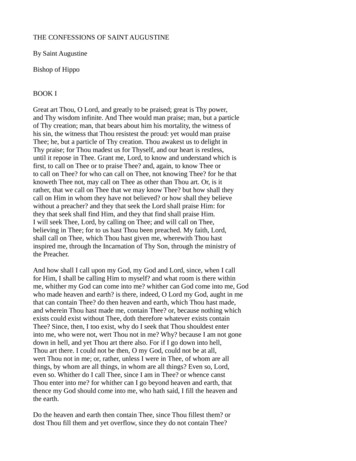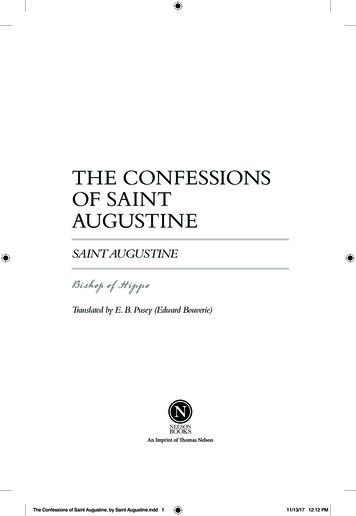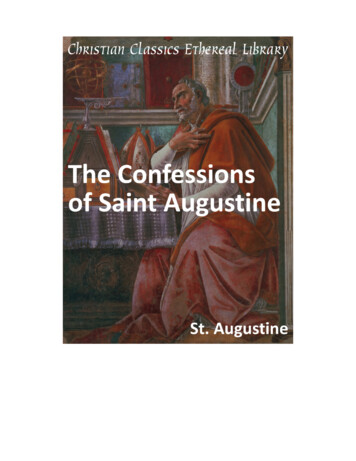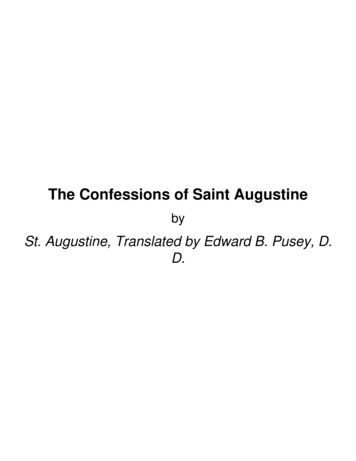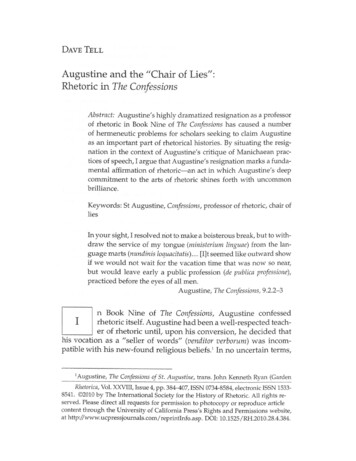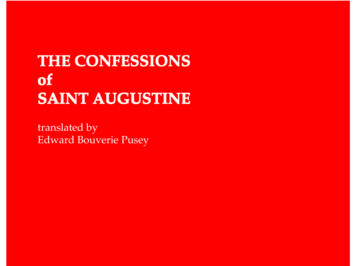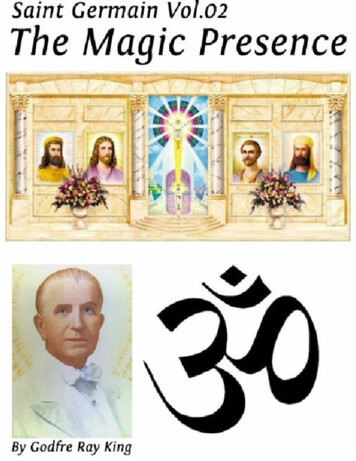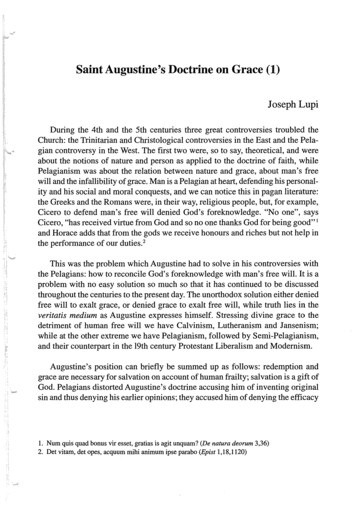
Transcription
Saint Augustine's Doctrine on Grace (1)Joseph LupiDuring the 4th and the 5th centuries three great controversies troubled theChurch: the Trinitarian and Christological controversies in the East and the Pelagian controversy in the West. The first two were, so to say, theoretical, and wereabout the notions of nature and person as applied to the doctrine of faith, whilePelagianism was about the relation between nature and grace, about man's freewill and the infallibility of grace. Man is a Pelagian at heart, defending his personality and his social and moral conquests, and we can notice this in pagan literature:the Greeks and the Romans were, in their way, religious people, but, for example,Cicero to defend man's free will denied God's foreknowledge. "No one", saysCicero, "has received virtue from God and so no one thanks God for being good" Iand Horace adds that from the gods we receive honours and riches but not help inthe performance of our duties. 2This was the problem which Augustine had to solve in his controversies withthe Pelagians: how to reconcile God's foreknowledge with man's free will. It is aproblem with no easy solution so much so that it has continued to be discussedthroughout the centuries to the present day. The unorthodox solution either deniedfree will to exalt grace, or denied grace to exalt free will, while truth lies in theveritatis medium as Augustine expresses himself. Stressing divine grace to thedetriment of human free will we have Calvinism, Lutheranism and Iansenism;while at the other extreme we have Pelagianism, followed by Semi-Pelagianism,and their counterpart in the 19th century Protestant Liberalism and Modernism.Augustine's position can briefly be summed up as follows: redemption andgrace are necessary for salvation on account of human frailty; salvation is a gift ofGod. Pelagians distorted Augustine's doctrine accusing him of inventing originalsin and thus denying his earlier opinions; they accused him of denying the efficacy1. Num quis quad bonus vir esset, gratias is agit unquam? (De natura deorum 3,36)2. Det vitam, det opes, acquum mihi animum ipse parabo (Epist 1,18,1120)
42Joseph Lupiof Baptism for according to them Augustine held that it had not completely takensin away; they accused him also of denying the existence of free will in man, as,they said, he held that free will was destroyed by sin, or, at least, that free will wasincompatible with his ideas of the efficacy of grace; he was accused of condemningmarriage for through it children are born in sin; and finally he was accused ofbeing a Manichee because of his doctrine on concupiscence. Augustine found nodifficulty in answering these charges as we will see further on; for the moment itis enough to hint at Augustine's answers; Augustine insists that his ideas are according to the teachings of the Church and that he always remained faithful to theseteachings: he never denied that Baptism remits all sins, what he held was thatBaptism destroys sin, but not the infirmitas which is the consequence of sin; henever taught that grace destroys free will, but, on the contrary, he held that gracestrengthens free will; and for him marriage was something good.Semi-Pelagianism is the term applied in the 17th century to those monks ofMarseilles who, although admitting the existence of original sin and the necessityof grace, had difficulty in accepting Augustine's idea on the relation between freewill, grace and predestination. Augustine insisted on God's initiative, while theSemi-Pelagians saw man's initiative as being more important. The origin ofSemi-Pelagianism was Augustine's De correptione et gratia: informed about theopinions of the monks at Marseilles 3 Augustine wrote two treatises: Depnedestinatione sanctorum and De dono perseverantice. But the controversy continued after Augustine's death, and Augustine was accused of holding blasphemiOllS ideas v.g. Christ has not died for all men; God created the majority of men fordamnation; those predestined to hell cannot say to God: Thy will be done, etc. 4Both Prosper of Aquitaine and Cesarius of ArIes defended Augustine and hadSemi-Pelagianism condemned in the Council of Orange in 529.Augustine's writings continued to be misunderstood throughout the centuries.In the 9th century, Godesca1c held that Augustine taught that Christ did not die forthe salvation of all men, and God's foreknowledge violently forces man to eternaldeath.5 This was also the idea of Wyc1if and Hus; later on it was taken up byCalvin whose theology is dominated by two great ideas, God's glory and "double"3. Epist. 225 and 2264. Capitula obiectionum Vincentianarum5. Christus mortem non pro omnium salute susceperit et pnescientia Dei hominen violenter compellitad mortem
Saint Augustine's Doctrine on Grace43predestination, either for good or for evil. These were also more or less, the thoughtsof Jansenius who held that Augustine taught that Christ did not die for all men,and those who held the contrary opinion were Semi-Pelagians.Luther thought that his doctrine on justification was based on Augustine's Despiritu et littera although he admitted that his doctrine of justification in Augustinecould be found but still not perfect (adhuc impe/fecte).On the other hand we have the decisions of the Council of Trent and theteachings of several Popes - Innocent I, Boniface U, John II, Leo XIII, Pius XI,Paul VI, who have extolled Augustine's teachings on original sin, necessity ofgrace and gratuity of justification.Augustine method against t his opponentsAugustine shows great respect for his adversaries and even praises their virtues(v.g. Augustine once wrote that he had heard that Pelagius was a holy man, and aChristian of no small regard)6 and their intelligence, and is very careful not to beoffensive in their regard; he even sometimes refrains from mentioning them byname not to lose their friendship (servata amicitia), and expresses his joy when hefinds he is in agreement with them on some point or other, so much so that he canwrite: "These words are mine also, no truer word can be said"7.He is always at pains to express his opponents' opinions as objectively as possible; he never attacked an opponent only on hearsay, but insisted on having hisopponents' writings before refuting their opinions.He always dealt with essentials, and criticized the Pelagians for insisting toomuch on accidentals without a clear distinction of terms, something which forAugustine was very important although he did not like arguing about terms8 aslong as the doctrine expressed by the terms was clear enough; he easily acceptedthe use of a word not clear enough for he clearly distinguished between the defence6. About Pelagius in De peccatorum meritis et remissione (3,1,1), Augustine wrote: Pelagii qmedamscripta, viri, ut audio, sancti et non parva profectu Christiani .7. Hrec et verba mea sunt, verius enim dici non potest, (De natura et gratia, 58,68)8. De verbis contendere non amamus .
44Joseph Lupiof a false doctrine of faith and the unhappy use of a phrase or sentence. 9 but hestrongly objected to expressions, even single words, which could change themeaning of a sentence: with reference to the efficacy of grace, Pelagius used thetermfacilius (more easily), a word which denied the necessity of grace for salvation,and held, that grace only made salvation easier.To avoid confusion, Augustme continually insists on the need of clear distinctions. With regard to original sin he clearly distinguishes between the traduxpeccati which is certain and the tradux animce which is discussed among scho larsand accuses the Pelagians of creating "clouds of darkness" (latebrarum suarumnebulas) by confusing the two questions, which are altogether different. He alsodistinguishes the existence of original sin, which is certain, from the nature oforiginal sin, which is a mystery; and finally he distinguishes "concupiscence initself' (concupiscentia in se) and "concupiscence in the present state of humanity"(concupiscentia qualis nunc est): concupiscence in the present state of humanityis not a sin, but an evil because of the disorders it brings in man. With regard tojustification he also makes some clear distinctions: in baptism remission of sin isfull and perfect (plena et perjecta), but this does not mean that the whole man isfully renewed: renewal begins with baptism and continues progressively till thefinal resurrection. Augustine clearly distinguishes between the truths the Pelagiansaccepted and those they denied; "When we insist with Pelagians . not to denyoriginal sin . or God's grace . they bring forth their 'clouds of darkness' to hidetheir errors. These 'clouds' (nebulce) are the praise of creatures, marrriage, law,free-will, the saints . as if there was some one among us who despised thesethings . " 10The whole problem was a theological problem not a philosophical one, and itis here that the Pelagians erred for they began their discussion from the data ofphilosophy, while Augustine started from the data of faith. The Pelagians quotedthe Scriptures continually but Augustine's impression was that they quoted theScriptures to prove what they had achieved through reason. Augustine's approachwas different.9. Alia est enim causa fidei same, alia locutionis incautre.10. Contra duas epistulas Petiliani 3,24
Saint Augustine's Doctrine on Grace45Addressing Pelagius, Augustine writes: "0 brother, it is a good thing if youremember that you are a Christian. To believe these things perhaps would be enough,but if you prefer discussion, there is no objection, and it would also be worthwhile if a very strong faith precedes our discussions, faith which will make us notthink that human nature cannot be vitiated by sin, but that faith based on theauthority of the Scriptures which will help us to find out how it could have beenpossible for human nature to be vitiated by sin . We must first submit ourselvesto the yoke of the authority of Holy Scripture, so that we might then arrive atknowledge through faith." 11Augustine always took a global view of the question he was discussing, andwith regard to nature and grace he criticized the Pelagians for limiting themselvesto one aspect of the question. Augustine to Pelagius' De natura replied with histreatise De natura et gratia for his aim was not denying what had been said butaffirming what had been denied, for grace does not deny nature but saves nature. 12Similar statements are continually met with in Augustine's writings. ToPelagius'insistence that people should convince themselves that they must accusethemselves when sinning, Augustine answers that they should also convincethemselves of the need of grace not to sin. And when Pelagius says that mancould, if he wanted, live without sin in this world, Augustine answered: "Maybe,but one should add that this is impossible without the grace of God." It is in sucha manner that Augustine continually answers the Pelagians with regard to deathbeing the punishment for sin 13, to redemption 14, to justification 15, to grace and freewill. 16Augustine always proceeded from what was evident to what was less evidentor was obscure: "Even if I am unable to refute these arguments, I feel that I must11. 0 frater, bonum est ut memineris te esse christianum. Credere ista fortasse sufficerit, sed tamenquia disputare vis, nee obest, sed etiam prodest, si firmissima pnecedat fides, non existimemuspeccato humanam naturam non posse vitiari sed divinis credentes Scripturis peccato earn esse vitiatamquomodo id fieri potuerit inquiramus . (De natura et gratia 20,22)Prius sanctarum Scriptararum auctoritatibus colla subdenda sunt, ut ad intellectum per fidem quisqueperveniat (De peccatorum meritis et remissione 3,4,7)12. Retractationes 2,4713. De peccatorum meritis et remissione 1,2,2;8,8.14. Ibid 1,13. 33-38, 56.15. De Spiritu et littera, passim.16. De Gratia et libero arbitrio, passim.
46JosephLupiaccept what is very clearly affirmed in the Holy Scriptures so that without anyhesitation I may believe those revealed truths which are obscure, or which mymind is unable to see although they can be proved or at least investigated if tooabstruse" .nCentral point of tbe controvery according to AugustineFor Augustine, Pelagianism was injurious to our salvation which is in Christ,pernicious and contrary to the religion we profess and to our piety for God 1S ,because if justification is through nature then Christ died uselessly.19 The wholeproblem is about the need of admitting a Saviour for young and old, for the criesof infants and the white hairs of the elderly (parvis et magnis, id est a vagitibusinfantum usque ad canos senum) and about the cure for which the Word becameflesh and dwelt amongst us (ea medicina qua Verbum Caro factum est ut habitaretin nobis) - once this is admitted the problem is solved (causa dissoluta est).20Augustine felt that he had to defend this truth so that the Cross of Christ would notbe emptied of its power (ne evacuetur crux Christi) (1 Cor 1,17); he consideredthe Pelagians as enemies of the grace of Christ (inimici gratice Christi) for denyingit. He felt the need to refute strongly and vehemently (acerrime et vehementissime)the terrible poison of their heresy (horrendum virus hceresis vestrce).Theologically speaking, according to Augustine, we must start considering theproblem not from Adam but from Christ, our starting point should be redemptionnot original sin.Granted that the Lord Jesus Christ did not come on earth for no any otherreason but to give life to all, save all, free, redeem all who were, through sin, dead,in languor, in servitude, in captivity, in darkness, under the power of the devil, theprince of sin,21 we must hold that redemption was necessary and that it was anobjective reality; in other words redemption was not simply the good example17. De peccatorum meritis et remissione 4,7.18. Noxium saluti nostrre qure in Cristo est, perniciosum atque contrarium ipsique religioni qua imbutisumus et pietati qua Deum colimus. (De peccatorum meritis et remissione 2,2,2,)19. Super naturam iustitia ergo Christus gratis mortuus est (De natura et gratia 2,2)20. De natura et gratia 52,60.21. De peccatorum meritis et remissione 26,39.
Saint Augustine's Doctrine on Grace47given to us by Christ, as the Pelagians contended (this was the horrendum virushceresis vestrce), but a reconciliation, an expiation, the gift of spiritual renewal.Redemption is universal: pro omnibus mortuus est Christus - Christ died for allmen: Augustine was continually saying this with Saint Paul, therefore all neededredemption, even infants; and if even infants needed redemption then even theywere born alienated from God. If redemption was not just a good example givenus by Christ, then Adam's sin is not just a bad example we imitate; if redemptionimplies reconciliation with God, then sin is a seperation and an alienation fromGod; and finally if justification means the gift of God's grace, then sin means alack of grace not brought about by one's actions (imitating a bad example, Adam's),but inherited through birth. From these premises, Augustine concludes that thehorrendum virus hceresis Pelagiance is considering God's grace not God's gift, butjust a good example given by Christ, and thus saying that we are justified simplyby imitating Christ and not by the gift of the Holy Spirit. And since redemption isfor all men, all are sinners,even infants; if one has died for all, all are dead (2 Cor5, 14); but the sin of infants can only be original sin.Saint Augustine expresses the parallelism between Adam and Christ, by speaking of unus et unus, of un us a giver of death and of un us a giver of life and thereforehe concludes omnis homo Christus and omnis homo Adam.PelagianismThe main exponents of Pelagianism were two laymen, Pelagius and Celestius,and a bishop Julian of Eclanum. Augustine refuted the works of all three althoughhe only knew personnally Pelagius, from whom he received a letter and which heanswered.Pelagius was born in Britain, probably in the same year as Augustine; for along while he resided in Rome but after the sack of Rome in 410 he went toPalestine. Of him Augustine says that he was a holy man and a Christian of nosmall standing 22 and that he was moderate in his ideas.22. [bid 3,1,1.
48JosephLupiCelestius was a jurist from Rome and a disciple of Pelagius; after the sack ofRome he went first to Africa and then to Palestine where he was ordained priest,more logical in the exposition of his ideas and more enterprising he brought onhimself the attention of the church of Carthage and his ideas were condemnedthere; probably Pelagianisn belongs more to Celestius than to Pelagius himself,and the latter took his distance from Coelestius at the synod of Diospolis.Julian was the most polemical and the most talkative of the three. Augustineconsidered him as "the architect of the Pelagian dogma", although he added nothing to the ideas of Pelagius and Coelestius except making them more radical.Augustine has this to say about his three opponents: "They are people whoshould not be considered as worthy oflow esteem . on the contary they are worthyof praise for their good works. They believe in the true Christ, equal and co-eternalwith the Father, who became true man and will come again, not like the Manicheeswho believe in a false Christ. But they ignore God's justice and want to establishtheir own".23The centres where Pelagianism mainly flourished wereRome where Pelagius had many friends and was greatly esteemed; a particularfriend of his was the priest Sixtus, who later became Pope; he was the friend ofMelania the Younger and Melania the Elder, of St Paulinus of Nola, and tookactive part in the discussions which were going on in Roman circles on Origenand 10vinian.Sicily: at Syracuse some Christians (quidem Christiani) were causing troublewith their ideas and a certain Hilary wrote to Augustine requesting his opinionabout the ideas these Christians were propagating. Augustine wrote a long letternot only refuting the ideas he had been told about, but also expressing his suspicionthat they were being diffused by Coelestius who was attracting several others tohis opinions.Carthage: in the year 411 Caelestius was accused of disturbing clergy andpeople with his ideas, which were summarised in six propositions; later on.23. Epist 140, 37, 83.
Saint Augustine's Doctrine on Grace49Augustine fully discussed and refuted these propositions in the first two books ofhis treatise against the Pelagians De peccatorum meritis et remissione. At the Synodof Carthage only two propositions were taken into consideration, namely thoseabout the nature of original sin: (i) Did Adam became subject to death after histransgression, or was he already subject to death before sinning? (ii) Is it certainthat the guilt of our sins and the guilt of original sin have the same origin?24At Carthage Augustine was not present and did not influence the decisionstaken. Caelestius was asked to retract his errors, but he refused and wasexcommunicated.Palestine: The Synod meeting in Jerusalem in 415, under Bishop John, a friendof Pelagius, was inconclusive.At Diospolis in Lydda (Palestine) in the same year, 14 bishops met under thepresidency of the metropolitan of Caesarea, and took into consideration (i) sixpropositions taken from Pelagius' work Testimonia, (ii) the six propositions whichhad been taken into consideration at the Carthage synod, (iii) three propositionswhich Augustine had received from Syracuse, and (iv) ten propositions taken froma book attributed to Coelestius. Pelagius explained the six propositions taken fromhis books, and condemned all the other propositions. His explanations satisfiedthe bishops and was absolved for he had condemned "Pelagianism", but Augustinehad his doubts about the sincerity of Pelagius' condemnation of "Pelagianism".The African Bishops informed Rome of the gravity of the problem sendingtwo letters to Pope Innocent stressing two principal errors: the uselessness of prayersof intercession and the uselessness of the baptism of infants; another letter wassent to the Pope from some bishops of Augustine's circle, with a copy ofPelagius'De natura and Augustine'S comments on it. The Pope wrote three letters in answersupporting the Mrican bishops and renewing the excommunication of Pelagiusand Coelestius till they recanted their errors. Following the Pope's letter, Augustinemore than once made his comments on the Pope's decision and in Sermo 131, 10he exclaimed "Rescripts have arrived from Rome; the problem is now definitelydecided; may the heresy also come to an end,"25 This statement became popularised24. An certe de eadem origine peccati, de qua nascitur, transgressionis culpam trahat.25. Inde etiam rescripta venerunt, causa finita est. Utinam aliquando finiatur error
50JosephLupiin the phrase: Roma locuta est, causa finita; in one of his letters Augustine wrotethat the Pope had told him that what was done was lawful and necessary26 and inone oftreatises against the Pelagians he wrote with the Pope's decision all doubtshad been resolved. 27But in fact, the result was altogether different, for Pelagius protested that hehad been misunderstood and wrote a libellus fidei; to Pope Zosimus who meanwhile had succeeded Pope Innocent. The Pope tried to bring about a reconciliation,writing two letters to the African Bishops telling them that they had been too hastyin their decisions and advised them to love peace, love one another, encourageagreement. 28 The letters caused great sorrow to Augustine and the African bishops, but Augustine was certain, as he later affirmed,29 that the Pope did not approvesome false dogma (nonfalsitas dogmatis probata est), but only expressed his desirethat all should make amends if they had erred against brotherly love (voluntasemendationis). We do not know exactly what really happened afterwards, but threefacts emerge: (i) a plenary Council of all Africa (concilium plenarium totius Africa?) condemned Pelagius and (ii) Caelestius escaped from Rome running away,refusing to be examined (se subtraxit et negavit examen), namely the audientiaplenior fixed by Pope Zosimus after receiving an answer to his letters from theAfrican bishops; (iii) the rescript of the 30th April, 418 by means of which theemperor Honorius ordered the expUlsion of the heretics. Convinced of the falsityof Pelagianism, Zosimus wrote a Tractatoria littera, which has been lost exceptfor some small fragments: some scholars basing themselves on these fragmentshave doubts whether Zosimus accepted the whole doctrine of the African bishopson original sin, or only parts of it.With the Tractatoria littera one could really say that causafinita est, but notAugustine's desire: utinam al iquando finiatur error, for Pelagianism through Julianof Ec1anum became a formal schism until it was finally condemned at Ephesus in431, when the decisions of Innocent I and Zosimus were ratified.26. Epist 186,2: quo fas erat et oportebat.27 . dubitatio tota sublata est (Contra duas epistulas Pelagianorum 2,3,5).28. Amate pacem,diligite caritatem, suadete concordiam.29. De gratia Christi et de peccato originali 2,7,8.
Saint Augustine's Doctrine on Grace51Towards the end of his life, Augustine in De hr:eresibus gives a summary ofPelagianism, begining by saying that "In our times Pelagianism, the last of allheresies, has arisen: it is due to Pelagius. Coelestius followed his master so faithfullythat their disciples are often called Coelestians".The Peiagians arei. so strongly opposed to the grace of God that they hold that one can obeyGod's commandments without the help of God's grace, but one should notconclude that grace is useless, for it helps to make easier the observance ofGod's commandments,11. they speak exclusively of the grace of free will given by God as a gift to manin creation, and sustained by God's law and doctrine,iii. they deny caritas by means of which one leads a pious life (pie vivitur), asbeing a gift of the Holy Spirit; they consider knowledge (which fills manwith pride) as a gift of God, but not the caritas (by means of which knowledgedoes not become a source of pride) as a gift of God;iv. they deny the efficacy of prayer both for pagans that they may be convertedand for the just that they may grow in faith and persevere,v. they hold that the just on earth are without sin: the just alone form the Church,which even on earth is without blemish,v!. they hold that children when born do not contract "the contagion of the ancientsin" and Baptism serves to bring them de bono in melius; unbaptised childrendo not enter the kingdom of heaven, but will enjoy eternal blessedness,vii. even if Adam had not sinned, he would have died, for death is natural to man.According to Augustine the above are the main tenets of Pelagians, while theother opinions they hold are derived from these.Augustine's opinion ofPelagius is expressed in the words with which he beginshis De natura et gratia to refute Pelagius' De natura: reading Pelagius' works,Augustine saw a man ardently zealous against those who sought not to accusetheir human will for their sins, but prefered instead to accuse human nature andthus excuse themselves. 30 Pelagius was thus a champion of free will, and for this30. Hominem zelo ardentissimo accensum adversus eos, qui cum in suis peccatis humanam voluntatemdebeant accusare, naturam potius accusantes per ilIam se excusare conantur (De natura et gratia1,1.)
52JosephLupireason Augustine defines him as an exalted defender of free will while his followerswere proud defenders of their free will. 3] Elsewhere32 he calls the Pelagians notonly defenders but also pompous defenders (inflatores) of free will, because, excluding grace, they make free will something empty and harmful.Augustine explained his doctrine of grace and free will in his De gratia etlibero arbitrio. At the synod of Diospolis, faced with his statement: "all are ruledby their free will," Pelagius explained that God gives his help so that man, throughhis free will, may choose to do good; but if man sins, it is wholly his fault, becauseof his free will. The bishops at Diospolis accepted this explanation, and Augustinecommented that no one could condemn free will, when we also have God's help.On Coelestius' statement that the will can very easily change itself willingly,33Augustine noted that with reference to a change of will, from evil to good, onewould be presuming too much without God's help.The principal consequences which Pelagians derived from their notion of freewill were,(i) Impeccantia (Pelagius insisted on this in his Testimonia, and the 6th proposition extracted from Pelagius' works and submitted to the Synod of Diospolisregarded this point). Augustine discussed impeccantia and refuted the Pelagianposition in his De peccatorum mentis et remissione. Augustine heard about thiskey-idea of Pelagianism, from Macellinus, prefect of Carthage, and at firstAugustine gave little importance to it, though he was convinced that it was a falseopinion.(ii) Denial of the necessity of grace. Augustine was certain about this fromPelagius' own treatise De natura. Pelagius did not explicity deny the necessity ofgrace: finding himself unable to answer the difficulties brought forward againsthis opinion he tried to avoid the problem by quibbling, and giving evasive andunsatisfactory answers. Coelestius was more explicit: he saw a contradictionbetween the necessity of grace and free will and so excluded grace to defend freewill: free will comes to an end if it needs help.34 Julian of Eclanum was more31.32.33.34.Pelagius: liberi arbitrii elatus assertor; Pelagians: superbi sui arbitrii defensores.Opus imperfectum contra Iulianum 2,154.Perfacile potest voluntas voluntate mutari.Destruitur voluntas qure alterius ope indiget.
Saint Augustine's Doctrine on Grace53radical for he held that with free will man had been freed from God (emancipatusa Deo). The principal argument of the Pelagians to prove that man does not needgrace to avoid sin, was that God does not demand the impossible. "This is true",replied Augustine, "but, to overcome certain difficulties and temptations wesometimes need a very strong will, and God knows that we do not always makeperfect use of a strong will, and so God helps us with his grace to overcome ourtemptation' .35 As a consequence of the denial of grace, the Pelagians concludedthat prayers of intercession were useless: "Why ask God for something which youalready have?"36At Diospolis Pelagius condemned Coelestius' opinion that grace is given to usfor single acts (ad singulos actus), but Augustine quoted a long extract fromPelagius' De libero arbitrio to show that Pelagius was in agreement with Coelestius. Augustine quoted at length to show that he was not distorting the ideas ofPelagius.(iii) According to Pelagius grace is (a) the gift of free will; (b) divine law, theGospels, Christ's example; (c) the remission of sins. Augustine remarks here thatthe Pelagians were omitting the most important aspect of grace, namely the caritas,the gift of the Holy Spirit which helps us to observe the law and persevere in itsobservance. According to Coelestius grace depends on merit and is not gratuitious.At Diospolis the following proposition, taken from a work of Coelestius, wastaken into consideration: "The grace of God is given to us according to our merits. grace is in my will, whether I am worthy of it or not." Pelagius at Diospoliscondemned this proposition, but, according to Augustine, this was a falsecondemnation, for it was not sincere, as Pelagius in all his writings continuallystated that grace is given to us by God according to our merits.(d) The Pelagians denied the possibility of human nature being weakened bysin, and therefore logically we cannot speak about "fallen" nature. The Pelagiansargued that sin is no
throughout the centuries to the present day. The unorthodox solution either denied free will to exalt grace, or denied grace to exalt free will, while truth lies in the veritatis medium as Augustine expresses himself. Stressing divine grace to the detriment of human free will we have Calvinism, Lutheranism and Iansenism;

